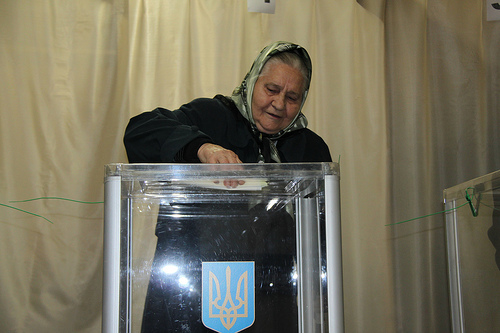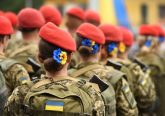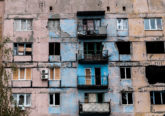
Ukrainian politicians have special talent for surprising the international community. First are the results. More eyebrow-raising is special way of organising them.
This time Ukraine’s parliamentary elections, held back at the end of October, started quite well. But while the voting process itself has been described as fair by most international observers, the political campaign and the actual counting of the votes – no doubt the most important part of the democratic election process — has been characterized by the abuse of power, the excessive role of money, extraordinary events such as power cuts in the polling stations, fights between party representatives, accusations of fraud and scandals in denying observers access to polling stations.
Seems the early optimism was misplaced. Being unusually direct, the observers from the Organization for Security and Cooperation in Europe (OSCE) have stated that the elections were even less fair than the previous ones in the history of Ukraine. Andreas Gross, head of the Parliamentary Assembly of the Council of Europe’s (PACE) observer mission, told reporters in Kiev last week that “Ukrainians deserve better than these elections. The ‘oligarchization’ of the whole process meant that citizens lost their ownership of the election, as well as their trust in it”.
The results are in nonetheless, showing a divided electorate. After legal, political and ocassionally physical battles for every vote at certain polling stations, two weeks after the elections took place, the results were finally announced on Sunday 11 November: the Party of the Regions (the President’s party) has 30 % of the votes to 25.5% for the Fatherland Party, the opposition party of the jailed ex-prime minister Mrs. Tymoshenko. Symbolically they have not made a replacement to the leadership. Below the top two world boxing champion Vitalii Klitschko’s party Udar (“The Punch”) won 13.96 %. The two biggest surprises, however, came from the Communist Party of Ukraine, gaining 13.2 %, and the Ukrainian far-right nationalist party Svoboda (“Freedom”) winning 10.4%. Predictions did not have them sure to surpass the 5% threshold barrier to get seats in the parliament.
Interestingly, the Svoboda party came first in the foreign electoral district, gaining overwhelming majority of votes from Ukrainian residents living in the USA, Canada, Australia, Great Britain, Sweden, Italy and Spain.
Generally, this result would give the majority of seats in the parliament to the united opposition forces and let the opposition form the coalition in the parliament. However, the 2012 elections use a mixed voting system (50% under party lists and 50% under simple-majority constituencies) which according to the results gives 185 seats to the Party of the Regions and only 178 seats to the united opposition forces. Such system was hugely criticized in 2011 by the Venice Commission while reviewing a proposed bill. The system with 225 local single-member districts elected by a first-past-the-post electoral system (highest vote wins) offers much room for manipulation, use of administrative resources and pressure, extortion, vote buying and putting only one candidate on the ballot in some districts. All are old tricks from Ukraine’s electoral past. Seeing them repeated would not be a surprise given the criminal record of the current president, Mr Yanukovych.
It’s not only the ruling party’s fault. The opposition and Tymoshenko’s party have themselves to blame for setting up elections in this way. Back in 2011 Mrs. Tymoshenko voted together with her party for this new law. Now Mrs. Tymoshenko is in jail, sentenced to 7 years for abuse of office, as is her prominent ally, former interior minister Yuri Lutsenko, sentenced to four years in prison.
“One should not have to visit a prison to hear from leading political figures,” said the OSCE representative, stating the obvious fact, after being denied by the authorities to see Mrs Tymoshenko in jail. She has declared a hunger strike in protest against fraudulent elections.
The OSCE observers together with EU representatives and other foreign observers, have criticized among other things the use of government resources on behalf of the Party of the Regions, the inability of opposition candidates to get television air time, the deployment of oligarchs’ money to influence the campaign and the absolute lack of transparency, in particular non-transparent vote counting.
Counting votes seems more difficult this time. The process seemed to be abnormally long (up to 3 days and 3 nights) in the areas where opposition enjoys strong support, and was marked with constant conflicts, strange power cuts in the polls and international observers or observers from opposition parties not being let into the polls at all: all symptomatic of possible attempts to alternate the results and change the voting papers. The Internet immediately filled up with videos of fraudulent substitution of voting papers.
Observers and members of the election commissions have been reported to be subjected to threats and pressure. OSCE observers also reported allegations that district election commissions members were being pressured to withdraw from their positions.
US Secretary of State Hillary Clinton added her voice to criticism of the election, saying: “We share the view of OSCE monitors that Sunday’s election constituted a step backward for Ukrainian democracy.”
The choice of the wording “Ukrainian democracy” seems ironic in light of reports of constant administrative pressure, intimidations of voters and opposition candidates, bribery, threats, alterations in voting papers and complete atmosphere of impunity.
Were the elections so fraudulent that the result will not be accepted by the USA or the EU? It seems unlikely. The rest of the world has enough problems of its own to care about.
A bigger question is whether it will be accepted by the Ukrainians? After the Orange Revolution, the majority of the population feels not only disappointed but apathetic. Ironically, this will allow Mr. Yanukovych to form a strong majority in the parliament and get ready for presidential elections in 2015. By this date foreign observers may not even be allowed in Ukraine — and the country more isolated and undemocratic than ever.








No Comment